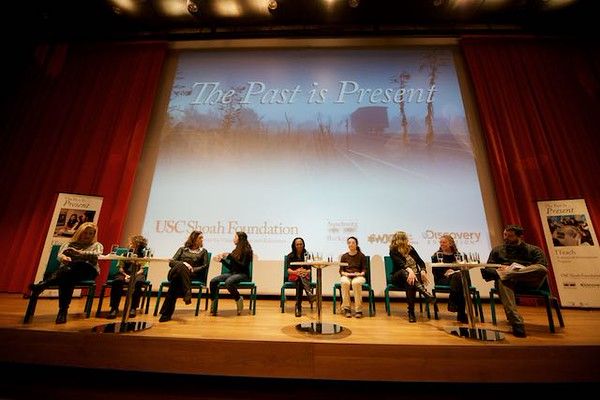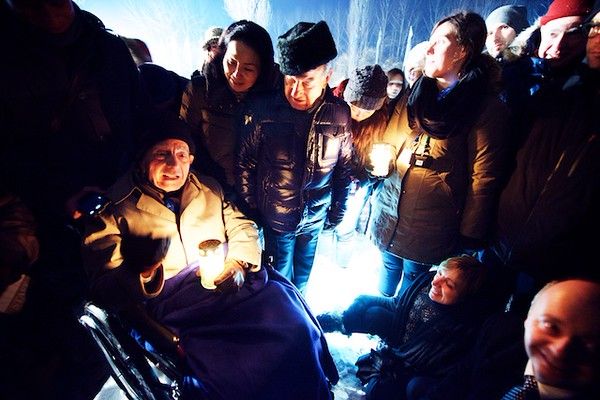An unforgettable trip to an unimaginable place
Last month, I had the amazing opportunity to travel to Warsaw and Krakow with USC Shoah Foundation’s mission to Poland for the Auschwitz: Past is Present program, commemorating the 70th anniversary of the liberation of Auschwitz.
I had many unforgettable experiences throughout these four days traveling and meeting incredible people who are all interested in the work of USC Shoah Foundation and its mission of changing the world through testimony.
The power of education
One of the highlights of this journey was a panel discussion titled Disrupting the Didactic: Making the Past Present featuring four of the 24 teachers selected for the Past is Present: ITeach professional program and four of the Institute’s junior interns. Teachers from around the United States, Canada, Europe and even Australia spoke about integrating testimonies from the Visual History Archive in their curriculum. The junior interns then described how this experience has inspired them to work with their teachers on including testimony in their classrooms. The discussion demonstrated the incredible work done by USC Shoah Foundation around the world.

The past is present
In addition to this panel, we were honored to hear from Paula Lebovics, a child survivor of Auschwitz, who remembered ashes raining down from the crematoriums on those who were spared, and how those ashes stuck to her skin like glue. It was a chilling description.
When we study the Holocaust we try to make sense out of an event that is senseless. We recognize how inhumane the actions of the Nazis were but, in fact, it was humans who were performing these ugly deeds and then denying them by destroying the evidence.
With all the emotion being stirred up, it was good to have USC Faculty Provost and Professor of Psychology Beth Meyerowitz with us in Poland to discuss what we were feeling. Our talk was cathartic, insightful and extremely thought provoking. This discussion made me think: Is part of the reason we don’t hear more from the survivors is because they are hardened by the lack of humanity? Or is it, perhaps the complete lack of vocabulary to pair words to the hideous conditions and actions?
As we walked around in Warsaw, covered in our warm coats, hats and gloves, I wondered how anyone interned in Nazi concentration camps with no warm clothing, no real sustenance and no comfort of family could endure what made us a bit uncomfortable for just an hour.
Remembering through eyewitness testimony
The mission traveled to Krakow for the official commemoration at Auschwitz-Birkenau State Museum on Jan. 27.

After attending the commemoration, I understand why many survivors never talked about the nightmare they experienced. It's simply too unimaginable. An indelible image of the horror that humans can wage against humans has been permanently etched in my mind and my heart, particularly as I live a life that has hardly been inconvenienced let alone imperiled.
To get off a comfortable bus when we arrived at the tent erected for the commemoration over the death gate and the train tracks of Birkenau, to hear the sound of a train in the distance, to see row after row of barracks, and to feel the wet, cold snow was nearly unnerving. I can’t fathom how t 300 survivors could return to this place bubbling with hate and intended for torture and death. But we – those of us in attendance who have now viewed the ceremony – are the beneficiaries of their courage.
There were many speakers that evening, but survivor Roman Kent’s speech, for me was the most touching. Roman expressed two inspiring appeals that moved me to tears. First, his suggestion that the Ten Commandments be augmented by a vitally important 11th Commandment, “We shall not be bystanders.” Second, his repeated pledge on behalf of all survivors, “We survivors do not want our past to be our children's future.”
Another unforgettable experience that evening was with Dario Gabbai. A 93-year-old survivor bound to a wheelchair, he made the half-mile trek from the death gate to the memorial. Our delegation gathered around him in the cold and the dark to hear snippets of his story near the places he was assigned to work as a Sonderkommando.
Dario remembered watching his fellow prisoners disrobe and shuffle into the gas chamber until there was no more room and seeing the door close behind them, knowing that in 20 minutes they would all be dead. His job was to remove the gold fillings from the teeth of the dead, a gruesome task that kept him alive. How is it that he could possibly find the resolve to sustain this job?

Dario told us that prisoners in Auschwitz were stripped of any individuality and any identity. He knew that if he didn’t do as he was expected, he would just perish with the others and someone else would take his job. There was simply no way out, which provided the resolve to move forward, day in and day out.
This unforgettable experience - listening to Dario speak overlooking the destroyed crematoriums, made me appreciate the Visual History Archive even more, knowing that his testimony, documenting the horrific procedures of the crematoriums will be preserved to educate future generations.
These stories of survival, luck, of incomprehensible resolve, strength, rationalization and hope are plentiful. We heard only a handful, and each was more powerful and heart wrenching than the next.
We need to use this anniversary as a springboard for change. We need to do what we can to ensure that our children don’t have to live in fear of history repeating itself. As the famous saying by George Santayana goes: “Those who don’t learn from the past are doomed to repeat it.”